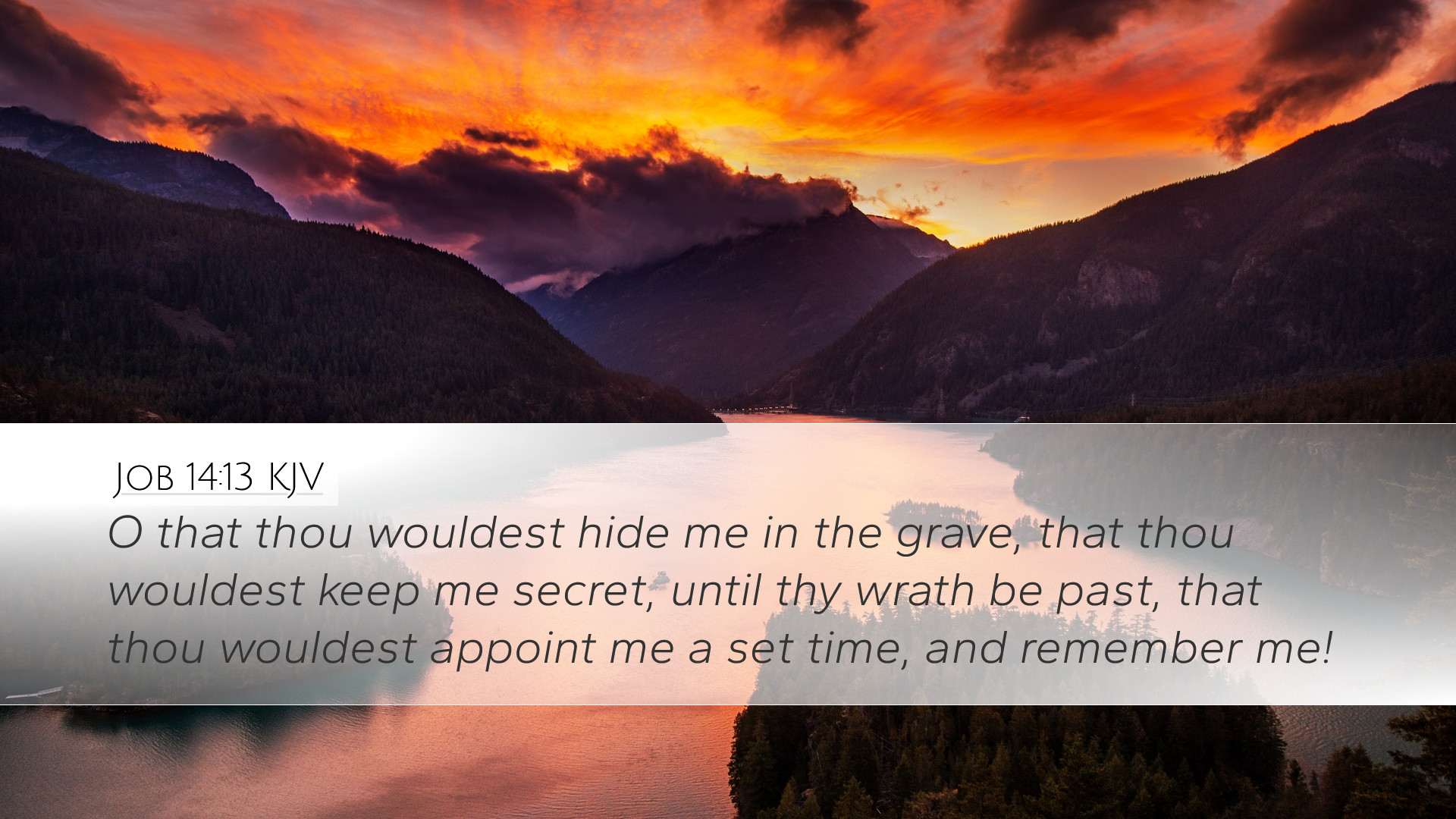Old Testament
Genesis Exodus Leviticus Numbers Deuteronomy Joshua Judges Ruth 1 Samuel 2 Samuel 1 Kings 2 Kings 1 Chronicles 2 Chronicles Ezra Nehemiah Esther Job Psalms Proverbs Ecclesiastes Song of Solomon Isaiah Jeremiah Lamentations Ezekiel Daniel Hosea Joel Amos Obadiah Jonah Micah Nahum Habakkuk Zephaniah Haggai Zechariah MalachiJob 14:13
Job 14:13 KJV
O that thou wouldest hide me in the grave, that thou wouldest keep me secret, until thy wrath be past, that thou wouldest appoint me a set time, and remember me!
Job 14:13 Bible Commentary
Commentary on Job 14:13
Job 14:13: "Oh, that You would hide me in the grave, that You would conceal me until Your anger is passed, that You would appoint me a set time, and remember me!"
Contextual Overview
The Book of Job presents a profound exploration of human suffering, divine justice, and the quest for understanding in the face of affliction. In this particular verse, Job expresses a deep yearning for respite from his suffering, highlighting his desire for concealment and protection under God's watchful care.
Insights from Public Domain Commentaries
Matthew Henry's Commentary
Matthew Henry elucidates this verse with a poignant reflection on Job's sorrow and his longing for relief from his suffering. Job’s wish to be hidden in the grave reflects an intense desire for peace away from the turmoil of earthly life. He metaphorically pleads for God to hide him until His anger has subsided, indicating that Job acknowledges the divine sovereignty even in his darkest hour.
Henry notes that this longing demonstrates a deep understanding of the nature of divine displeasure and a heartfelt appeal for mercy. While Job feels abandoned, he still turns towards God, suggesting that even in despair, there remains a flicker of faith—the belief that God can and will remember him.
Albert Barnes' Commentary
Albert Barnes emphasizes the desperation in Job's desires, framing it within the larger context of human mortality and divine judgment. He interprets Job's plea as an acknowledgment of the reality of death and the hope that it offers. Barnes highlights that Job’s desire to be concealed in the grave not only showcases his wish to avoid current suffering but also reflects a broader theological reflection on mortality and the afterlife.
Moreover, Barnes points out the notion of God 'appointing a set time' and 'remembering' Job, which provides an intricate view of divine providence. Here, Barnes stresses the importance of faith in God's plans and the assurance that God has a purpose even during times of anguish.
Adam Clarke's Commentary
Adam Clarke provides a critical analysis of Job’s emotional state in this verse, considering both the psychological and spiritual dimensions of his plight. Clarke interprets Job’s cries as a reflection of his profound isolation and the existential question of suffering, underscoring the human desire for understanding in the face of inexplicable pain.
Furthermore, Clarke draws attention to the theological implications of waiting for divine intervention. The appeal to be remembered by God suggests an understanding of covenant relationship grounded in mutual remembrance, with Job yearning for God to restore him in due time.
Theological Reflections
The combined insights from these commentaries reveal several theological strands present in Job's plea. The primary themes include:
- The Nature of Suffering: Job's lament captures the essence of suffering as both a personal and communal experience, resonating with the understanding that pain often invites deeper spiritual reflection.
- God’s Sovereignty: All three commentators emphasize Job's acknowledgment of God's power and sovereignty over life and death, reiterating the belief that suffering serves a purpose in God's divine plan.
- Hope and Despair: Despite his anguish, Job leans on hope. This tension between despair and hope serves as a crucial element in the human experience, reminding believers that even in suffering, there exists a capability to reach out to the Divine.
Application for Pastors, Students, and Theologians
The insights from Job 14:13, along with said commentaries, have profound applications for contemporary ministry and theology. For pastors, Job's model of lament can guide congregations in expressing their grief. It reminds leaders that anguish is not a sign of weak faith but an integral part of the human experience that invites divine engagement.
Students and theologians can glean from Job’s honest pleading a framework for understanding the complexities of faith under trial, illustrating that seeking God in times of trouble is not only natural but necessary. In lessons about death, suffering, and hope, this verse is a poignant reminder of the possibility of divine remembrance and renewed relationship.
Conclusion
In summary, Job 14:13 serves as a poignant reminder of the interplay between human suffering and divine providence. Through the lenses of Matthew Henry, Albert Barnes, and Adam Clarke, we gain a rich, multi-faceted understanding of Job's lament. This deep dive into the text encourages reflection, offering hope that in our darkest moments, we may still find refuge and reassurance in God's faithful remembrance.


